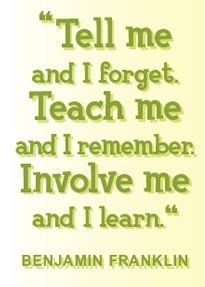The Seven Principles of Effective Compassion
-
Affiliation
Connect with people and help people reconnect
 The first question we must ask when trying to serve the poor is not, “How may I help you?” Before we create a new program or before we contribute to a charity we must ask, “Does it work through families, neighbors, and religious or community organizations? Is this charity bypassing these basic communities to create a bottomless pit of services?
The first question we must ask when trying to serve the poor is not, “How may I help you?” Before we create a new program or before we contribute to a charity we must ask, “Does it work through families, neighbors, and religious or community organizations? Is this charity bypassing these basic communities to create a bottomless pit of services?
When homeless shelters simply hand out food, clothing, and/or housing without asking hard questions, they run the risk of enabling and furthering alienation. This is true of any poverty-alleviation effort. In the past, charities first tried to restore family ties that had been surrendered before attempting to intervene. The first question was, “Who is supposed to help in this case?” When individuals applied for material assistance, charity volunteers tried first to reabsorb into the context of basic communities those who, for one reason or another, were not connected, those who were not bound to the community. In 1897, Mary Richmond of the Baltimore Charity Organizing Society offered the wisdom we need today:
“Relief given without reference to friends and neighbors is accompanied by moral loss. Poor neighborhoods are doomed to grow poorer whenever the natural ties of neighborliness are weakened by well-meant but unintelligent interference.”
For example, studies show that many homeless alcoholics do have families but the homeless do not want to be with them. When homeless shelters provide food, clothing, and housing without asking hard questions, aren’t they subsidizing disaffiliation and enabling addiction? Instead of giving aid directly to the homeless, why not work on reuniting them with brothers, sisters, parents, wives, and/or children? True, it is not always possible but in “thinking outside the box” we will discover new and more effective ways to attend to needs.
Are we offering a mirage of independence and acting out of an emotional attachment to the idea of rescuing people? A better plan for, say, a pregnant teen girl in need is to reunite her whenever possible with those on whom she actually depends, whether she admits it or not: her parents and the child’s father. It may feel good to give Christmas presents to poor children, but when the “helper” gives a shiny new fire truck that outshines the second-hand items a poor single mom put together, the damage is done. A better plan is to bulwark the beleaguered mom by enabling her to provide a better present. When a do-gooder gives toys to “poor children” whom he will never meet (nor want to meet), he is not really helping.
-
Bonding
Helping One Person at a Time
 In the past, if people had no one to go t0 — no family or friends — volunteers worked one-on-one to become, in essence, new family members for them. They were willing to connect and bond, not just provide services to people or connect them to the manacles of bureaucratized “compassion.” Instead of today’s massive food-dispensing programs that treat people as numbers, or even as pets, volunteers were given the narrow responsibility of making a difference in one life over several years. The spectacle of masses of people in line to get stuff is not the road to wholeness.
In the past, if people had no one to go t0 — no family or friends — volunteers worked one-on-one to become, in essence, new family members for them. They were willing to connect and bond, not just provide services to people or connect them to the manacles of bureaucratized “compassion.” Instead of today’s massive food-dispensing programs that treat people as numbers, or even as pets, volunteers were given the narrow responsibility of making a difference in one life over several years. The spectacle of masses of people in line to get stuff is not the road to wholeness.
Bonding with those in need offers us accurate information on how to help effectively. It offers those wanting to help the opportunity to attend to the deeper human need instead of settling only for meeting the immediate and apparent need. Bonding offers the information that the price system provides in a free economy: information on where and how to effectively allocate resources. Bonding is the gauge helping us to be good stewards of our resources by knowing better what the actual need is. Moreover, bonding recognizes that each of us is unique and unrepeatable, not simply a token in a mass of humanity.
Relationships are only as strong as they are open and honest. Do we challenge people or are we afraid to “offend” them? Political correctness can be a powerful tool when we are afraid of doing or saying anything that might be seen as offending groups that are considered “at risk.” However, when you bond with individuals there is a great divide that narrows as people understand that you care. You earn a right to talk when you care for “Jose Perez” or “Steve Rose” instead of just the label of “poor” or “client” or “case.”
Some failed programs spend a lot of money but are too stingy with what is truly important: treating people as human beings made in God’s image, not as animals.
Love and discipline are essential. Why do we demand so much from our own children but give without restraint to the children of the poor? When we do not challenge, the unspoken underlying assumption is that they are inferior, incapable of transcending the circumstances of their lives and therefore in need of our pity.
-
Categorization
Treating each person individually
 In the past charities and churches understood that two people in exactly the same material circumstances but with different values and different lifestyles needed different treatment. One might benefit most from some material help and a pat on the back; the other might need spiritual challenge and a push; others, a good “kick in the rear.” If a person just suffered the terrible loss of his home due to a tornado or a fire, you do not tell him, “Hey, be self-reliant!” But if one is given options for living and simply refuses to responsibly work toward the goal of a home, he must be challenged on his assumptions and does not deserve what others might deserve. Categorization is exactly the opposite value at the heart of the Welfare State. One is not entitled based simply on need.
In the past charities and churches understood that two people in exactly the same material circumstances but with different values and different lifestyles needed different treatment. One might benefit most from some material help and a pat on the back; the other might need spiritual challenge and a push; others, a good “kick in the rear.” If a person just suffered the terrible loss of his home due to a tornado or a fire, you do not tell him, “Hey, be self-reliant!” But if one is given options for living and simply refuses to responsibly work toward the goal of a home, he must be challenged on his assumptions and does not deserve what others might deserve. Categorization is exactly the opposite value at the heart of the Welfare State. One is not entitled based simply on need.
When we refuse to categorize, we become bureaucracies of “compassion”, channeling people through amoral lines of “help.” We become functionaries instead of believers offering a faithful presence among the poor.
In the past those who were orphaned, elderly, or disabled received aid; jobless adults who were “able and willing to work” received help in finding a job. Those who preferred to live on alms or were of “confirmed intemperance” were not given material assistance. An entitlement mentality—which is omnipresent in today’s society–is destructive to the fiber of a nation and is not the same as Christian love. It offers us an opportunity to feel good and “clear” our conscience, at the expense of the dignity of the poor.
“Work tests” helped to provide relief with dignity. When an able-bodied man came to a homeless shelter, he often was asked to chop wood for two hours or to whitewash a building; in that way he could provide part of his own support and also help those unable to chop wood. The work test, along with teaching good habits and keeping away those who did not really need help, enabled charities to teach that those who were being helped could still help others. Today, we need to stop talking about “the poor” in abstraction and start distinguishing once again between those who truly yearn for and need help and those who just want an enabler. Programs have the chance to succeed only when categories are established and firmly maintained. Work tests can help: Why shouldn’t some homeless men clean up streets and parks and remove graffiti? Why can people not be asked to clean up after themselves or pay some money for what they receive?
-
Discernment
Be a good steward, give responsibly, demand responsibly
 “Intelligent giving and intelligent withholding are alike true charity,” the New Orleans Charity Organization Society declared in 1899. Isn’t that the way we raise our children? Do we give them what they ask every time they ask? Why not? Because we know it is not good for them and we truly love them. Charity seems to start in the heart, as the one who has no inclination or desire to help others will not do anything. But it cannot go from the heart directly to the muscle as action ends up becoming the instrument to satisfy feelings, appetites or emotional states. Emotions can be powerful motivating factors but also a destructive element when they mobilize us into action by bypassing “the head,” that is, an unintelligent assessment of the real needs of the poor. Only by discerning in an intelligent way can we help people the right way.
“Intelligent giving and intelligent withholding are alike true charity,” the New Orleans Charity Organization Society declared in 1899. Isn’t that the way we raise our children? Do we give them what they ask every time they ask? Why not? Because we know it is not good for them and we truly love them. Charity seems to start in the heart, as the one who has no inclination or desire to help others will not do anything. But it cannot go from the heart directly to the muscle as action ends up becoming the instrument to satisfy feelings, appetites or emotional states. Emotions can be powerful motivating factors but also a destructive element when they mobilize us into action by bypassing “the head,” that is, an unintelligent assessment of the real needs of the poor. Only by discerning in an intelligent way can we help people the right way.
Poverty fighters a century ago trained volunteers to leave behind a conventional–but vital– attitude toward the poor, seeing them through the comfortable haze of their own good intentions. Barriers against fraud were important not only to prevent waste but to preserve morale among those who were working hard to remain independent:
Nothing is more demoralizing to the struggling poor than successes of the indolent.
Poorly rendered charity also created uncertainty among givers as to how their contributions would be used and led to less giving over the long term. It was important to “reform those mild, well-meaning, tender-hearted, sweet-voiced criminals who insist upon indulging in indiscriminate charity.” Compassion was greatest when givers could “work with safety, confidence, and liberty.” Today, lack of discernment in helping poor individuals is rapidly producing an anti-compassion backlash, as the better-off—unable to distinguish between the truly needy and the grubby-grabby—give to neither. The proliferation of non-profits operating as micro-bureaucracies creates uncertainty regarding the effectiveness of all non-profits. This helps in the expansion of government intervention to meet “unmet needs.” Meeting unmet needs should not be the primary purpose of charity work. Remember: There is a savior, and it is not you!
-
Employment
Demand work!
“The problem before those who would be charitable, is not how to deal with a given number of the poor; it is how to help those who are poor, without adding to their numbers and constantly increasing the evils they seek to cure.”
So wrote New York charity leader Josephine Lowell over 100 years ago. This wisdom is as true today as it was then, as it always will be. If poverty is what brings the money into your program, why bother trying to end poverty? Many organizations are invested in the very problem that they are trying to solve. Work offers a new horizon with the opportunity to end the cycle of dependency.
If people were paid for not working, the number of non-workers would increase and children would grow up without seeing work as a natural and essential part of life. The same happens if your organization focuses more on meeting unmet needs rather than showing the way toward self-reliance. Why is that? Because we get more of what we incentivize. If we incentivize poverty, we get more poor people. If we focus strongly on work, we get more people working. Governmental as well as private programs operating without the discipline of the marketplace are inherently flawed, because their payout comes from what is regarded as an inexhaustible source, and people who once receive it are likely to regard it as a right, implying no obligation on their part.” Incentives are more important than dispositions.
“But there are no jobs around!” It is understandable that people have come to expect government to solve every economic crisis. Yet, when people begin to see themselves as the source of wealth creation and as engines of economic activity, they begin to see that there is such a thing as an entrepreneurial vocation.
Today, programs that stress employment, sometimes in creative ways, need new emphasis. For example, more of the able-bodied might receive not housing directly but the opportunity to work for a home through “sweat equity” arrangements in which labor constitutes most of the down payment. Those who exhibit a strong work ethic can, at times, get more rewards than those who do not, by getting the best subsidized apartment with an option to buy, or get more food for the family in times of need. Some who start in vigorous programs of this sort drop out with complaints that too much sweat is required. They find champions who would prefer to see a Department of Housing and Animal Development passing out free cages; but one person who stayed in a program said at the end, “We are poor, but we have something that is ours. When you use your own blood, sweat, and tears, it becomes part of your soul. You stand and say, ‘I did it.'”
-
Freedom
Reducing barriers to enterprise
“Freedom is the delicate fruit of a mature civilization.” –Lord Acton
Freedom is a responsibility more than it is a right. It is a burden to be free because freedom demands personal accountability. The more we focus on the role of the state as provider of security and benefits, the more difficult it is to see freedom as the best instrument for meeting our needs. More importantly, the more we see ourselves as rescuers of the poor, the less effective we will become. Instead of being witnesses to the miracle of lives lived fully we will become poverty managers, keeping people more or less well-fed but still poor. The greater the appetite for the mirage of “security” offered by macrosystems or by well-intentioned but ineffective “do-gooders,” the more we harm people and the less free they become. Freedom demands we stay in the background, as scenery in the drama of a person’s journey towards integral human fulfillment. If we insist on being rescuers and protagonists, we dim the light of freedom in the hearts of men.
Charity workers a century ago did not press for government programs but instead showed poor people how to improve their lives while resisting enslavement to government masters. Job freedom was the opportunity to drive a wagon without paying bribes, to cut hair without having to go to barbers’ college, and to get a foot on the lowest rung of the ladder, even if the wages there were low. Freedom was the opportunity for a family to escape dire poverty by having a father work long hours and a mother sew garments at home. Life was hard, but static, multi-generational poverty of the kind we now have was rare; those who persevered moved away beyond poverty.
Obstacles are actually the instrument for success. If we impede humans the freedom to struggle, because we want to remove the obstacle, we deprive people of the opportunity to grow.
People must be allowed to fail, if that is what they choose. Failure is a teacher. At the very least, freedom is an exemption from the power of others. At its best, it is the pursuit of what is really good. To act justly toward those seeking freedom we must create processes with just characteristics, but we can never guarantee equality of outcomes.
-
God
We are not just flesh …
True philanthropy must take into account spiritual as well as physical needs.
Poverty fighters a century ago acknowledged this and were more successful in helping those in need. Christians worshipped a God who came to earth and showed through His life and death the literal meaning of compassion—suffering with another. Groups such as the Industrial Christian Alliance noted that they used “religious methods”—reminding the poor that God made them and had high expectations for them—to “restore the fallen and helpless to self-respect and self-support.” If it is true that we are spiritual beings, how can we truly help the poor in purely secular terms? Challenge that goes beyond the material is still essential to fighting poverty. In Washington, D.C., multimillion dollar programs have failed, but a mile from the U.S. Capitol success stories are being created by Christian ministries such as Clean and Sober Streets, the Gospel Mission, which fights homelessness by offering true hope; and the Capitol Hill Crisis Pregnancy Center. To be successful in eliminating poverty, we must remember that we are more than bodies to be clothed and mouths to be fed.
Christians must choose. Are we hired hands of the state, willing to trade our faith for some dollars, or are we the Lord’s hands among those who suffer?
Giving by itself is morally neutral. We need to give rightly so as not to impede the development of values that enable people to get out of poverty and stay out. When we understand that the preceding principles of effective compassion are aligned well with a correct understanding of the human person provided in a context that respects faith we see how vital faith is. If anything, belief in God helps us be less self-centered!
Now, faith-based organizations must beware of becoming the hired hand of the state by depending on government funds. When we entertain ideas about the Kingdom of God here on earth, we must understand the limitations of temporality and the transcendent nature of our work. With that conviction, we must understand that our work, in the end, is not to be measured empirically by a record of services provided but instead by the strength of our dedication and commitment to our values. It is the profound moral worth of our ideas and the humbling closeness of our presence that counts the most in our work, not the scope of services we might provide.

